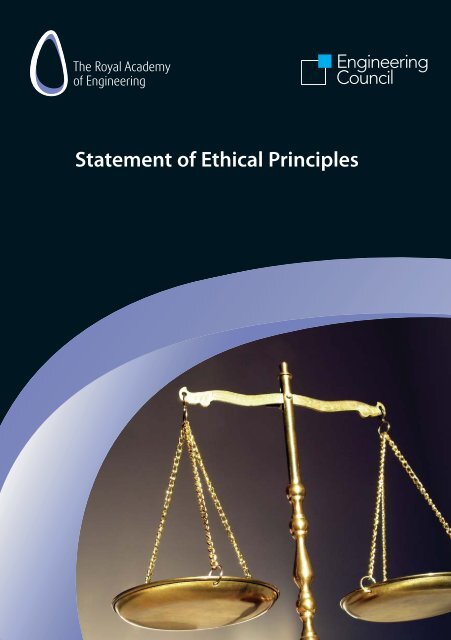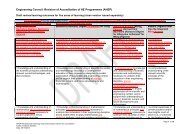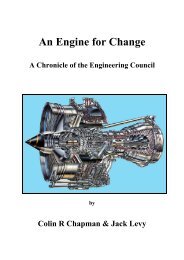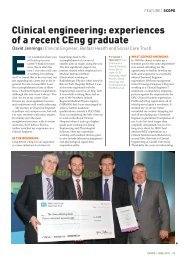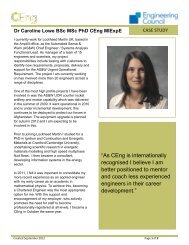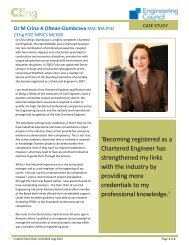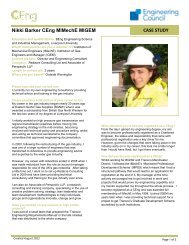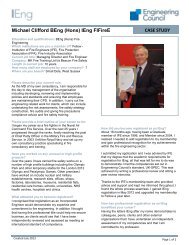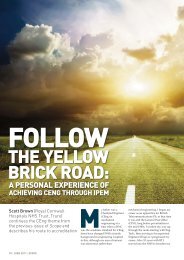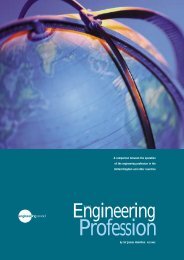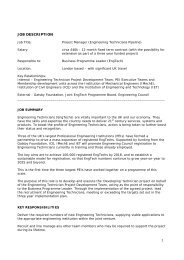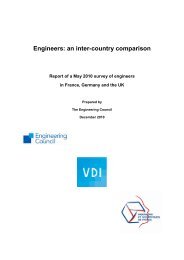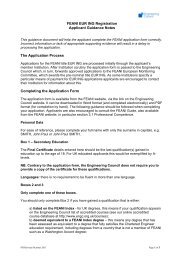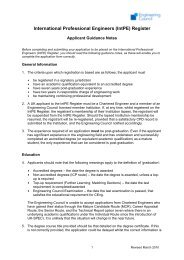Statement of Ethical Principles - Engineering Council
Statement of Ethical Principles - Engineering Council
Statement of Ethical Principles - Engineering Council
Create successful ePaper yourself
Turn your PDF publications into a flip-book with our unique Google optimized e-Paper software.
<strong>Statement</strong> <strong>of</strong> <strong>Ethical</strong> <strong>Principles</strong>
<strong>Statement</strong> <strong>of</strong> <strong>Ethical</strong> <strong>Principles</strong>The Royal Academy <strong>of</strong> <strong>Engineering</strong>, in collaboration with the <strong>Engineering</strong> <strong>Council</strong> and a number<strong>of</strong> the leading pr<strong>of</strong>essional engineering institutions, has created a <strong>Statement</strong> <strong>of</strong> <strong>Ethical</strong> <strong>Principles</strong>to which it believes all pr<strong>of</strong>essional engineers and related bodies should subscribe.Pr<strong>of</strong>essional Engineers work to enhance the welfare, health and safety <strong>of</strong> all whilst paying due regardto the environment and the sustainability <strong>of</strong> resources. They have made personal and pr<strong>of</strong>essionalcommitments to enhance the wellbeing <strong>of</strong> society through the exploitation <strong>of</strong> knowledge and themanagement <strong>of</strong> creative teams.This <strong>Statement</strong> <strong>of</strong> <strong>Ethical</strong> <strong>Principles</strong> sets a standard to which members <strong>of</strong> the engineering pr<strong>of</strong>essionshould aspire in their working habits and relationships. The <strong>Statement</strong> is fully compatible with theprinciples in the UK Government Chief Scientific Adviser's Universal <strong>Ethical</strong> Code for Scientists*, withan emphasis on matters <strong>of</strong> particular relevance to engineers. The values on which it is based shouldapply in every situation in which pr<strong>of</strong>essional engineers exercise their judgement.There are four fundamental principles that should guide an engineer in achieving the high ideals <strong>of</strong>pr<strong>of</strong>essional life. These express the beliefs and values <strong>of</strong> the pr<strong>of</strong>ession and are amplified below.* www.dti.gov.uk/science/science-and-society/public_engagement/code/page28030.htmlAccuracy and RigourPr<strong>of</strong>essional Engineers have a duty to ensure that they acquireand use wisely and faithfully the knowledge that is relevant to theengineering skills needed in their work in the service <strong>of</strong> others.They should:• always act with care and competence• perform services only in areas <strong>of</strong> current competence.• keep their knowledge and skills up to date and assist thedevelopment <strong>of</strong> engineering knowledge and skills in others.• not knowingly mislead or allow others to be misled aboutengineering matters.• present and review engineering evidence, theory andinterpretation honestly, accurately and without bias.• identify and evaluate and, where possible, quantify risks.
Honesty and IntegrityPr<strong>of</strong>essional Engineers should adopt the highest standards <strong>of</strong>pr<strong>of</strong>essional conduct, openness, fairness and honesty. Theyshould:• be alert to the ways in which their work might affect others andduly respect the rights and reputations <strong>of</strong> other parties.• avoid deceptive acts, take steps to prevent corrupt practices orpr<strong>of</strong>essional misconduct, and declare conflicts <strong>of</strong> interest.• reject bribery or improper influence.• act for each employer or client in a reliable and trustworthymanner.Respect for Life, Law andthe Public GoodPr<strong>of</strong>essional Engineers should give due weight to all relevant law,facts and published guidance, and the wider public interest. Theyshould:• ensure that all work is lawful and justified.• minimise and justify any adverse effect on society or on thenatural environment for their own and succeeding generations.• take due account <strong>of</strong> the limited availability <strong>of</strong> natural andhuman resources.• hold paramount the health and safety <strong>of</strong> others.• act honourably, responsibly and lawfully and uphold thereputation, standing and dignity <strong>of</strong> the pr<strong>of</strong>ession.Responsible Leadership:Listening and InformingPr<strong>of</strong>essional Engineers should aspire to high standards <strong>of</strong>leadership in the exploitation and management <strong>of</strong> technology.They hold a privileged and trusted position in society, and areexpected to demonstrate that they are seeking to serve widersociety and to be sensitive to public concerns. They should:• be aware <strong>of</strong> the issues that engineering and technology raise forsociety, and listen to the aspirations and concerns <strong>of</strong> others.• actively promote public awareness and understanding <strong>of</strong> theimpact and benefits <strong>of</strong> engineering achievements.• be objective and truthful in any statement made in theirpr<strong>of</strong>essional capacity.
The Royal Academy <strong>of</strong> <strong>Engineering</strong>As the UK’s national academy for engineering, we bring together the mostsuccessful and talented engineers from across the engineering sectors for a sharedpurpose: to advance and promote excellence in engineering. We provide analysis andpolicy support to promote the UK’s role as a great place from which to do business.We take a lead on engineering education and we invest in the UK’s world classresearch base to underpin innovation. We work to improve public awareness andunderstanding <strong>of</strong> engineering. We are a national academy with a global outlookand use our international partnerships to ensure that the UK benefits frominternational networks, expertise and investment.The Academy’s work programmes are driven by four strategic challenges, each <strong>of</strong>which provides a key contribution to a strong and vibrant engineering sector andto the health and wealth <strong>of</strong> society.Drive faster and more balancedeconomic growthThe strategic challenge is to improve thecapacity <strong>of</strong> UK entrepreneurs and enterprisesto create innovative products and services,increase wealth and employment andrebalance the economy in favour <strong>of</strong>productive industry.Lead the pr<strong>of</strong>essionThe strategic challenge is to harness thecollective expertise, energy and capacity <strong>of</strong>the engineering pr<strong>of</strong>ession to enhance theUK’s economic and social development .<strong>Engineering</strong> <strong>Council</strong>Foster better education and skillsThe strategic challenge is to create a system<strong>of</strong> engineering education and training thatsatisfies the aspirations <strong>of</strong> young people whiledelivering the high calibre engineers andtechnicians that businesses need.Promote engineering at theheart <strong>of</strong> societyThe strategic challenge is to improvepublic understanding <strong>of</strong> engineering, increaseawareness <strong>of</strong> how engineering impacts onlives and increase public recognition for ourmost talented engineers.Under its Royal Charter, the <strong>Engineering</strong> <strong>Council</strong> regulates the engineering pr<strong>of</strong>ession in the UK, through 36pr<strong>of</strong>essional engineering institutions who are licensed to put suitably qualified members on the <strong>Engineering</strong><strong>Council</strong>’s Register <strong>of</strong> Engineers. The Register has three sections: Chartered Engineer, Incorporated Engineerand <strong>Engineering</strong> Technician. Entry to the Register is governed by UK-SPEC, an internationally recognisedstandard <strong>of</strong> pr<strong>of</strong>essional competence and ethics, for engineers, technologists and technicians, published bythe <strong>Engineering</strong> <strong>Council</strong>.Please recycle this brochure (the cover is treated with a recyclable laminate)The Royal Academy <strong>of</strong> <strong>Engineering</strong>promotes excellence in the science,art and practice <strong>of</strong> engineering.Registered charity number 293074The Royal Academy <strong>of</strong> <strong>Engineering</strong>3 Carlton House Terrace, London SW1Y 5DGTel: 020 7766 0600 Fax: 020 7930 1549www.raeng.org.uk


